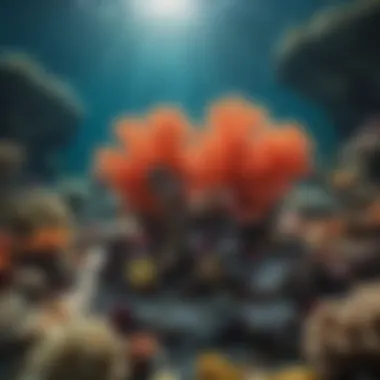Shark Finning: Ecological Impact and Ethical Concerns


Intro
Shark finning is more than just a practice; it holds significant implications for our oceans, biodiversity, and the very fabric of marine ecosystems. This activity, characterized by the harvesting of shark fins while often discarding the remainder of the body, has spurred a storm of concerns among environmentalists, scientists, and the general public alike. The shadows cast by this trade reach far beyond the water's surface, affecting health, ecological balance, and even ethical considerations in culinary practices.
As we venture into an analysis of shark finning, it is crucial to grapple with its historical context, understanding why it came to prominence in various cultures, and what drives the demand for shark fin soup. Although delectable in certain circles, the repercussions of this delicacy ripple throughout marine life, raising questions about sustainability and conservation efforts.
Moreover, legislative measures have earned increasing scrutiny. Countries are beginning to establish laws aimed at regulating or outright banning this brutal practice. Advocacy campaigns have emerged, rallying hearts and minds to the cause, pushing for more informed choices among consumers and enthusiasts alike. A deep dive into the nuance of this topic will illuminate not only the environmental peril but also the role each of us can play in turning the tide against this detrimental practice.
By the end of this exploration, we will not only understand the impact shark finning has on various aspects of our world, from health ramifications to ecological outcomes, but also recognize the essential role of public awareness in tackling this pressing environmental dilemma.
Understanding Shark Finning
Shark finning is a practice that remains shrouded in controversy and misinformation. It's crucial to illuminate what it is and why it matters. The demand for shark fins, primarily for use in shark fin soup, has serious repercussions on marine life and ecosystems. It’s not just about one culinary tradition; it’s about understanding the ripple effects that such demands create across the oceans. As responsible sports enthusiasts and adventure seekers, recognizing these implications helps to foster a more informed, respectful relationship with our natural resources.
Definition and Overview
Shark finning involves the removal of fins from sharks and often discarding the remainder of the shark back into the ocean, typically when it is still alive. This act is both inefficient and brutal, leading to a slow and painful death for the animal as it sinks to the ocean floor, unable to swim. The fins are valued for their perceived status and flavor in certain Asian cuisines, particularly in soups, contributing to a lucrative black market.
The sharks’ fins can fetch high prices, causing fishers to target certain species aggressively. Alarmingly, it’s estimated that tens of millions of sharks are killed annually for their fins alone. This overfishing disrupts the delicate balance of marine ecosystems, on which numerous species, including humans, depend.
Historical Context
To fully grasp the complexities around shark finning, we need to take a step back in time. The practice roots back centuries, often tied to cultural traditions in places like China. Shark fin soup was historically regarded as a delicacy associated with wealth and prosperity, often reserved for special occasions. However, as populations grew and globalization expanded, so did the demand for shark fins.
Over the years, the cultural significance of shark fin soup transformed. From being primarily reserved for celebratory feasts, it has increasingly become a symbol of affluence. This shift has spurred widespread fishery practices that cannot sustain high fin harvests without devastating shark populations, significantly more than historical practices. These practices date back to the early twentieth century but took off after World War II, leading to modern trends of mass overfishing.
In recent years, awareness has grown regarding the ecological implications of this trade. Various advocacy groups and individuals initiated campaigns to educate the public about the environmental costs associated with shark finning. Considerable effort now focuses on altering cultural perceptions around the practice and promoting conservation efforts.
Note: Understanding the nuances of shark finning, both historically and socially, is key to addressing the issue effectively. Awareness can lead to more sustainable practices and a collective shift in consumer behavior.
Recognizing this historical context sets the stage for the discussions ahead. It becomes evident that tackling this issue requires a multifaceted approach, not just regulatory but also cultural and ethical.
By exploring Understanding Shark Finning, we pave the way for deeper dives into its ecological consequences, legal frameworks, and ethical considerations.
Ecological Consequences
The practice of shark finning stands as a double-edged sword, wielding significant ecological implications that extend far beyond the just the shores or the coastal communities. Understanding these consequences is crucial for comprehending how this industry fits into the larger web of marine biodiversity. The sheer importance of maintaining a balanced ecosystem cannot be overstated. Sharks, often called the ‘apex predators’ of the ocean, play a vital role in regulating marine populations. Without them, the marine food chain becomes unbalanced, leading to unforeseen repercussions.
Impact on Shark Populations
Shark populations are facing a steep decline due to finning, which is a jeopardy not just for the species, but for entire marine ecosystems. It’s estimated that about 100 million sharks are killed each year due to shark finning. This staggering figure reveals the dark side of a practice that often goes unnoticed by the average consumer.
Declining shark populations can allow prey species, like smaller fish, to proliferate unchecked. This results in overgrazing of vital vegetation, like seagrass or coral reefs. Without predators to control their numbers, these species can disrupt established ecological relationships and fundamentally alter underwater landscapes. In the long haul, these dramatic shifts can lead to a ripple effect, possibly causing extinction events across various marine life forms. As the saying goes, “you don’t miss the water till the well runs dry.” This rings particularly true for sharks. Fewer sharks mean a diminished ability to maintain ecological balance.
Ripple Effects on Marine Ecosystems
The removal of sharks from marine ecosystems send shockwaves through the habitats they inhabit, leading to a chain reaction that can affect various organisms. When sharks are removed or significantly reduced, the populations of mid-level predators rise and create a vacuum significantly affecting the biodiversity.
For example, a study showed that in regions where shark populations plummeted, there was a marked increase in the number of rays. This paradoxically encouraged a decrease in the populations of shellfish and crustaceans, as these rays hunted them with increased efficacy. As a side note, the decline of these shellfish populations can lead to harmful algal blooms, as these filters of the sea are essential for maintaining water quality.
In essence, the health of marine ecosystems hinges on the presence of sharks. If trends continue, we could start to witness changes that extend beyond the water and impact fisheries, tourism, and even coastal community cultures reliant on balanced marine environments.
“Removing sharks from the ocean ecosystem is like pulling a keystone from an arch; the entire structure could collapse.”
This encapsulates the critical role sharks play. By understanding these ecological consequences, we aren't just shedding light on the import of sharks. We’re also advocating for informed choices that back sustainable practices for not just current, but future generations. Awareness is the first step toward action.
Legal and Regulatory Framework
The legal and regulatory framework surrounding shark finning is vital in addressing the unsustainable practice that threatens not only individual shark species but also the delicate balance of marine ecosystems. With shark populations plummeting globally, effective laws and regulations can act as barriers against the rampant exploitation of these majestic creatures. This framework aids in establishing conservation priorities, fostering sustainable fishing practices, and consequently preserving marine biodiversity. Without stringent regulations, the future of sharks hangs precariously in the balance.
International Regulations
At the international level, various treaties and agreements aim to regulate and combat shark finning. The Convention on International Trade in Endangered Species (CITES) is one such treaty that monitors trade in species at risk. In fact, several shark species have been listed, limiting the trade of their fins, thus placing an essential check on the industry. Moreover, organizations like the Food and Agriculture Organization (FAO) have issued guidelines encouraging countries to adopt prohibited practices concerning finning.
Interestingly, the sheer diversity in regulatory approaches among countries presents both challenges and opportunities. While some nations have strong laws against shark finning, others remain relatively lenient, allowing illegal practices to thrive. This discrepancy often leads to what’s known as ‘regulatory loopholes,’ where enforcement remains weak or uncoordinated. The need for a unified international stance is critical in establishing a level playing field.
"Without a global commitment, we risk turning the ocean’s apex predators into mere shadows of their former selves."


Furthermore, regional agreements, such as the Memorandum of Understanding (MOU) on the Conservation of Migratory Sharks, focus on conservation efforts in specific regions. They facilitate collaboration between countries, promoting shared responsibilities and actions necessary to protect migratory shark species. This international cooperation is paramount considering the migratory nature of sharks; the preservation of these animals can't happen in isolation.
National Policies and Enforcement
Nations also play a critical role in shaping the legal framework governing shark finning. Countries like the United States, Australia, and several members of the European Union have implemented national bans on the practice. These policies often stem from a growing awareness of the ecological impacts and ethical concerns related to shark finning. However, implementing the policy is one thing, while enforcing it remains another beast altogether. Some regions face significant difficulties ensuring compliance due to limited resources or a lack of commitment to conservation.
Law enforcement agencies must work in tandem with local communities to build a culture of respect for these regulations. Incentives for local fishers to shift away from finning can also bolster enforcement efforts, as can increased penalties for violators. Education plays a pivotal role here as well, fostering acknowledgement of the interconnectedness of shark populations and the overall health of marine ecosystems.
Ultimately, ensuring that national policies align with international regulations is crucial. A lack of coordination may create sanctuary for illegal fishers, undermining conservation efforts made elsewhere. Dedicated efforts from both legislation and enforcement sides pave the way to safeguarding sharks from the clutches of finning.
In summation, while the legal and regulatory framework offers a foundation for combating shark finning, the effectiveness of these measures hinges on international cooperation and strict enforcement at national levels. As the stakes rise, the global community must rally to ensure that the interests of marine life, ecosystems, and future generations are prioritized over short-term gains.
Ethical Considerations
Understanding the ethical considerations surrounding shark finning is crucial. The practice raises profound questions about our responsibilities towards animals, the environment, and society at large. Discussions around ethics in this context often lead to broader conversations about human values, cultural heritage versus progressive conservation, and the implications of our consumption choices.
Animal Rights Perspective
The animal rights viewpoint on shark finning is stark and straightforward. It hinges on the belief that all animals have inherent rights and that practices leading to suffering or death for trivial purposes are ethically indefensible. Sharks, like any other creature, experience pain. The act of finning—which often leaves sharks to die slowly and agonizingly after being tossed back into the ocean without their fins—elicits strong emotional responses from advocates of animal rights.
"Every creature's life is meaningful; to toss aside life for luxury is a moral failing."
These advocates argue that shark finning not only causes suffering but also reflects a disdain for biodiversity and the ecological roles these creatures play in their environments. By prioritizing taste or tradition over animal welfare, we risk normalizing abuse toward intelligent beings. The statistics are stark—millions of sharks perish each year just for their fins. This raises ethical dilemmas:
- Can we justify severe harm for cultural dishes, like shark fin soup?
- Are we prepared to accept grave ecological disruption?
By evaluating these thorny issues, it's clear that choosing cruelty over compassion is a slippery slope.
Cultural Practices vs Conservation
Cultural traditions often intertwine with the practice of shark finning. For some communities, especially in parts of East Asia, shark fin soup is a prized dish, symbolizing wealth and status during celebrations like weddings or festivals. This cultural significance complicates the conservation narrative.
While it’s essential to respect cultural identities, can tradition justify harm to marine ecosystems? Conservationists face the daunting challenge of negotiating preservation of cultural practices with dire ecological warnings. It’s a classic case of tradition clashing with modern ethics.
Here’s where the dialogue becomes critical:
- Should conservationists work to change these cultural narratives?
- Is it possible to honor traditions while promoting sustainable alternatives?
The way forward may lie in education and awareness-raising initiatives that recognize the importance of these cultural practices, while simultaneously advocating for a shift towards sustainability. It becomes a balancing act—appreciating cultural backgrounds while championing ecological integrity.
In summary, navigating the ethical waters of shark finning requires thoughtful engagement with animal rights and an understanding of cultural richness. The aim isn’t to vilify communities but to foster discussions that inspire change without disregarding heritage. It calls for a unified effort—one that melds compassion for marine life with respect for cultural identities.
Advocacy and Activism
In the discussion of shark finning, advocacy and activism serve as crucial pillars in bringing awareness, driving change, and fostering conservation. This part of the article sheds light on how passionate individuals and groups mobilize resources and public opinion for the protection of sharks and marine ecosystems. Such efforts are vital as they build momentum for legislative changes and ignite public interest in ethical consumption.
Grassroots Movements
Grassroots movements have emerged as potent forces in the fight against shark finning. These initiatives often sprout from the community level and engage local populations in advocacy. They might start with a handful of environmentally-conscious individuals, rallying their neighbors, friends, and even social media followers to join their cause. Think of it like a snowball effect—what begins as small dialogue can gain a life of its own and spread across different communities.
Local activists organize events, such as beach cleanups and educational workshops, to inform people about the detrimental impacts of shark finning. These actions work to raise consciousness around marine biodiversity and the ecological balance that sharks maintain in their environments.
An illustration of such a grassroots success is the movement in California, where a coalition of marine enthusiasts, divers, and conservationists influenced legislative change through relentless campaigning. Their collaborative efforts led to the state’s ban on shark finning, setting a precedent for other states to follow.
Benefits of Grassroots Activism
- Community Engagement: Involving people from local communities can lead to stronger connections toward the cause.
- Personal Stories: Activists often share emotional narratives that resonate with the public, helping others understand the issue on a personal level.
- Change at the Local Level: Grassroots movements often achieve notable successes in local legislation, setting the stage for larger, national or international efforts.
Role of Non-Governmental Organizations
Non-Governmental Organizations (NGOs) play a pivotal role in the advocacy ecosystem for sharks. These organizations often possess the resources, expertise, and outreach capability to tackle issues that grassroots movements might not manage alone. Many NGOs specialize in marine conservation, striving to protect not just sharks but various marine species.
For instance, the Shark Trust and Oceana work tirelessly to campaign for sustainable fishing practices and enforce stricter regulations on shark finning. Their comprehensive reports and research help inform policymakers and the public of the stark realities pertaining to shark populations and their ecological role.
“The shark crisis is a marine crisis,” says Dr. Sylvia Earle, world-renowned marine biologist. “Without them, we lose the balance of life in the oceans.”
Through educational programs, these NGOs foster behavioral change in consumers. They help equip consumers with the knowledge to make informed purchasing decisions. They also utilize social media and campaigns to draw attention to key legislation. Advocacy through NGOs can often lead to more significant changes on a broader scale because they have a platform that reaches beyond local initiatives.
Contributions of NGOs


- Research and Advocacy: NGOs often conduct crucial research that drives policy changes, highlighting the importance of sharks within marine ecosystems.
- Public Education: Awareness campaigns led by NGOs inform the broader public about the implications of their consumer choices.
- International Collaboration: Many NGOs have global reach, fostering collaborations between countries to tackle shark finning at the international level.
In summary, the collective efforts of grassroots movements and NGOs create an ecosystem of advocacy and activism that is critically needed in the fight against shark finning. Both play an essential role in reshaping attitudes, proposing solutions, and mobilizing resources. Together, they build a future where sharks are protected, ensuring healthy oceans for generations to come.
Consumer Awareness and Responsibility
In the fight against shark finning, consumer awareness and responsibility play a pivotal role. People often underestimate their power as consumers. Every choice made at the seafood counter can ripple out into the larger ocean of marine conservation. By understanding the implications of their purchases, buyers can become advocates for change.
Informed Choices in Seafood Consumption
Making informed choices isn’t just about picking a seafood dinner. It’s a conscious decision that weighs the environmental toll of each item on the menu. Shoppers should be aware of the fishing practices behind their food. For instance, asking about where and how the fish was sourced can lead to better choices. Supporting vendors that respect sustainable fisheries fosters practices that help keep fish populations stable.
Moreover, recognizing labels can also inform purchasing decisions. Look for certifications such as the Marine Stewardship Council (MSC) or the Aquaculture Stewardship Council (ASC). These labels indicate that the seafood has been derived from responsible fishing practices. It’s not merely a sticker; it’s a commitment to not just the fish, but to the ecosystem as a whole.
Support for Sustainable Practices
Everyone can support sustainability directly or indirectly. By choosing restaurants and retailers that commit to sourcing sustainable seafood, consumers send a strong message about their priorities. This, in turn, pushes suppliers to reevaluate their policies and adopt eco-friendly practices.
The benefits of supporting sustainable practices extend beyond the ocean. It can also have positive effects on local economies. When consumers choose local fisheries, they bolster their community by promoting jobs while ensuring that fishing practices are not destructive. This creates a loop where economic viability and ecological responsibility coexist.
"Responsible consumption can be a bridge to recovery for our oceans. Every dollar spent is a vote cast for a healthier planet."
In essence, when consumers educate themselves, they empower not just themselves but also their communities, paving the way for a future where sharks can swim freely without the threat of finning hovering overhead.
Economic Implications
The intertwined nature of shark finning and economy brings profound implications for local and global markets. It's not simply an issue of harming wildlife; it ripples through commerce, social structures, and ultimately, everyday lives. Understanding these economic dimensions is essential for stakeholders—from policymakers to consumers—who seek to balance economic interests with ecological sustainability. The marketplace which thrives on shark fins faces scrutiny under the lens of conservation, ethical practices, and environmental stewardship.
Market Demand for Shark Fin Products
Global appetite for shark fin soup has driven the fishing industry toward unsustainable practices. This product is often viewed as a symbol of wealth and status, despite its questionable nutritional value. Traditionally served at celebration or gatherings, its cultural significance keeps demand alive. However, the very basis of that demand is gradually being challenged as more people recognize its implications for ecosystems.
Shark fins fetch a high price on the market—often hundreds of dollars per kilogram. Wealthy consumers, especially in parts of Asia, sustain this lucrative trade, pushing fishers to target sharks intensely. This not only affects shark populations but also impacts broader marine ecosystems that depend on the health of these apex predators.
The question of how economic systems can effectively integrate sustainability into market demands presents a real conundrum. Advocates for sustainable practices are working tirelessly to redirect the market toward products that do not threaten marine biodiversity.
- Price Volatility: As shark populations decline, prices tend to fluctuate, making fisheries less reliable in income generation.
- Alternative Ingredients: The rise of substitutes is gaining traction, showing promise in reducing the dependence on shark fins in culinary traditions.
"The economic implications of this trade aren't just numbers on a spreadsheet; they represent livelihoods, cultural practices, and the ecological balance of the oceans."
Impact on Local Economies
In coastal communities, especially in developing regions, fishing, including shark finning, plays a crucial role in sustaining local economies. Fishermen often rely on shark fins as a significant source of income. However, dwindling shark populations are leading to a decline in this source, resulting in potential economic downturns.
For many, especially small-scale fishers, the loss of shark fishing can mean more than just a hobby; it challenges the very fabric of their community. Fishing provides employment, sustenance, and cultural identity. A progressive approach to conservation could, however, mitigate these effects while securing livelihoods. For example:
- Ecotourism: This emerging industry can create new avenues for income, promoting the beauty of sharks rather than their exploitation.
- Sustainable Fishing Practices: Implementing responsible fishing methods ensures continued access to marine resources.
In the long run, an investment in sustainable practices could transform the economic landscape, transforming fisheries into conservation proponents rather than contributors to decline. The shift might not be easy, but the dividends could pay off for both people and the planet.
The Role of Science and Research
The examination of shark finning extends beyond the surface, diving into the depths where science meets conservation. Scientific research is pivotal in understanding the multifaceted effects of shark finning on both marine ecosystems and global biodiversity. This exploration not only enhances our knowledge but also equips policymakers, conservationists, and activists with the necessary tools to combat the detrimental impacts of this practice.
Research initiatives delve into various dimensions, from shark population dynamics to the ecological consequences of their depletion. Such studies highlight the interconnectedness of marine life and the potential cascading effects that arise from the loss of apex predators like sharks.
Additionally, scientific research provides a foundation for evidence-based advocacy, ensuring that claims and strategies are rooted in fact rather than emotion or conjecture. In a world where misinformation can easily proliferate, the integrity of scientific data serves as a solid bedrock for effective policy formation and public awareness campaigns.
Current Research Initiatives
Currently, a variety of research initiatives are underway focusing on shark populations and their habitats. These studies take many forms:
- Population Assessments: Researchers are conducting assessments to understand population sizes and trends. This involves tagging and tracking sharks to monitor their movement patterns and breeding grounds.
- Ecological Impact Studies: Many scientists are examining the ripple effects of diminished shark populations on marine ecosystems. For instance, studies show how the decline in shark numbers can lead to an overpopulation of prey species, which can further disrupt the balance of the ecosystem.
- Genetic Research: Genetic studies are also gaining traction. By analyzing DNA samples, scientists can draw conclusions about genetic diversity and the health of shark populations, which is crucial for conservation efforts.
Such meticulous initiatives help tailor conservation strategies that are not only efficient but also sustainable in the long term, addressing the complexities that come with marine ecology.
Importance of Scientific Data in Policy Making


The weight of scientific data in policy making cannot be overstated. It serves as the guiding light in the often murky waters of environmental legislation. Here’s why scientific research is essential:
- Informed Decision-Making: Policymakers rely on data to make decisions that impact legislation. Accurate data helps them understand the urgency of the situation and the potential long-term consequences of their actions.
- Public Trust: When policies are backed by credible research, it bolsters public trust in regulatory bodies, encouraging community engagement in conservation efforts.
- Resource Allocation: Scientific evidence helps determine how resources should be allocated in conservation projects, ensuring that funding is directed towards the most critical areas.
- Adaptability of Policies: As new data emerges, policies can be promptly adjusted to reflect current realities and challenges. This flexibility is vital in a field where conditions are often changing.
"Scientific research is not just an academic exercise; it is a lifeline for the marine ecosystems and the species dependent on them."
By prioritizing scientific inquiry, stakeholders can develop strategies that support the survival of shark populations and protect the overall health of marine environments. This intertwined relationship between science and policymaking defines the pathway forward in the fight against shark finning.
Global Perspectives
Exploring shark finning from a global viewpoint allows for a better understanding of how this practice varies across different cultures and regions. This section will dive into the specific methods utilized in various locales as well as international efforts addressing this critical issue. The implications of shark finning stretch far beyond any one country, extending into global biodiversity, economics, and cultural narratives. By examining diverse perspectives, we can recognize the complexities surrounding this controversial practice and marshalling a collaborative response can yield fruitful results.
Regional Variances in Shark Finning Practices
Shark finning is not a monolithic practice. It bears different forms, driven by cultural context and regulatory environments. In Asia, for example, the demand for shark fins is closely linked to culinary traditions, particularly in countries like China and Japan. Here, shark fin soup is often considered a symbol of status and luxury at wedding banquets or other major celebrations. This cultural significance creates a strong demand, resulting in a more aggressive fishing approach.
Contrastingly, in some South American nations like Ecuador or Brazil, shark populations are often targeted due to less stringent regulations. Fishermen might engage in finning as a supplemental activity, driven by economic necessity and the relative abundance of species in their waters. Here, sharks might not possess the same cultural cachet as in Asian markets but nonetheless face exploitation due to lack of legal protections.
Africa presents yet another scenario; numerous countries within the continent are grappling with the balance between tradition, subsistence fishing, and burgeoning commercial interests. The lack of regulatory frameworks leads to rampant overfishing, where sharks are caught for both meat and fins, thus placing immense pressure on already vulnerable species.
It's salient to note these regional variances, as they ultimately dictate not only the health of marine environments but also the livelihoods of communities dependent on fish stocks. The diversity of practices can inform not only localized conservation strategies but also global discussions about ethical and sustainable fishing practices.
International Collaboration on Conservation Efforts
As the saying goes, "many hands make light work." This adage rings true when it comes to tackling the profound issue of shark finning on a worldwide scale. International collaboration is paramount in orchestrating meaningful conservation efforts. Various entities, ranging from governmental organizations to non-profits and grassroots movements, work hand in hand to create frameworks that stabilize shark populations across borders.
One notable example is the Convention on International Trade in Endangered Species of Wild Fauna and Flora (CITES), which has engaged multiple nations in protecting vulnerable shark species from trade-related exploitation. By creating lists of species that are at risk, CITES urges countries to enforce strict regulations on shark catches and fins. Adhering to these international agreements presents an opportunity for countries to showcase their commitment to biodiversity.
Additionally, organizations such as Wildlife Conservation Society and Shark Trust actively promote joint projects that aim to educate communities, shift consumer attitudes, and bolster regulatory frameworks. These initiatives underscore the interconnectedness of ecological health and economic prosperity, weaving the narrative that healthier marine ecosystems equate to more sustainable fishing practices, ultimately benefitting local economies associated with ecotourism.
Efforts like these not only provide a platform for knowledge exchange but also cultivate international solidarity in conservation. Engaging a global audience, paired with localized action, fosters a more impactful response against shark finning as a widespread issue.
"The ocean's health is a reflection of our own; protect it and we protect ourselves."
*
Considering the ecological, cultural, and economic facets of shark finning on a global scale is vital. By fostering international dialogue and cooperation, we set the stage for more comprehensive solutions designed to sustain both shark populations and the ecosystems they inhabit.
Future Directions
The issue of shark finning is at a critical juncture where innovative solutions can shape its future. Understanding the importance of future directions in combating this practice is crucial for any informed discussion about sustainable fishing. By focusing on innovative conservation strategies and the role of technology, we can devise effective approaches that protect shark populations and maintain marine ecosystem balance.
Innovations in Conservation Strategies
To combat shark finning effectively, creative conservation strategies are emerging. Some of these strategies incorporate local community involvement, adopting a comprehensive approach that emphasizes education and sustainable practices.
- Community-Based Programs: Engaging local populations can foster a sense of ownership over marine resources. Educational workshops and training empower communities to protect sharks, turning locals into advocates for their protection.
- Marine Protected Areas (MPAs): Establishing areas where fishing is restricted can provide safe havens for sharks. These zones not only contribute to the regeneration of shark populations, but they also enhance biodiversity.
- Eco-Tourism Initiatives: Promoting shark diving and eco-tourism generates income while emphasizing the value of live sharks versus the financial gain from finning. Tourists often pay handsomely to see these creatures in their natural habitat, thus providing a strong argument against killing them.
- Education and Awareness Campaigns: Creating widespread campaigns to inform consumers about the consequences of shark finning and the benefits of sustainable practices plays a vital role. Interactive platforms can leverage social media for broader outreach. This engagement can highlight the ecological role that sharks play.
These innovations provide various benefits, including enhancing local economies, protecting biodiversity, and developing a sustainable balance between human activity and marine health.
Role of Technology in Combating Shark Finning
Advancements in technology offer promising avenues to fight against shark finning practices. Technology can increase transparency, improve monitoring, and enforce regulations more efficiently.
- Satellite Tracking: Utilizing satellite technology to monitor shark movements helps in understanding their patterns and protecting them in critical habitats. By keeping tabs on their migratory routes, conservationists can implement timely interventions to curtail finning activities.
- Blockchain for Transparency: Implementing blockchain technology can enhance transparency in the seafood supply chain. It allows consumers to trace the source of their seafood, ensuring they are not unknowingly supporting illegal finning.
- Mobile Apps for Reporting: Providing fishermen and citizens with easy-to-use mobile apps encourages reporting of illegal finning activities. It makes it simpler to collect data on finning incidents, aiding enforcement agencies in real-time.
- Drones for Surveillance: Drones can conduct aerial surveillance of fishing activities, making it easier to spot illegal finning operations and gather evidence for prosecution.
Finale
The topic of shark finning touches on multiple dimensions, intertwining ecological health, ethical debates, and economic realities. As we've journeyed through this article, it's clear that the implications of shark finning extend far beyond the shores where this practice often thrives. Highlighting the key elements surrounding the practice reveals a complex web of interactions that affect marine ecosystems and our responsibilities as stewards of the ocean.
Summary of Findings
In our exploration, we've uncovered several critical findings:
- Ecological Impact: The practice of shark finning has a direct correlation with declining shark populations, which disrupts the balance of marine ecosystems. Shark species play pivotal roles in maintaining the health of ocean environments.
- Legal Framework: Despite some international regulations, enforcement remains inconsistent across different regions. Nations must prioritize robust policies to combat illegal shark finning practices effectively.
- Cultural Dimensions: While some cultures view shark fin soup as a delicacy rooted in tradition, the conservation standpoint demands reevaluation of these practices, weighing them against the broader ecological costs.
With these insights in hand, it’s crucial to consider future conservation strategies that integrate scientific research and international collaboration. By fostering a deeper understanding of the interconnectedness of our actions with marine life, we can forge a sustainable path forward.
Call to Action for Readers
As responsible individuals engaged in various marine activities—be it sports, education, or marketing—there's much that can be done to combat the practice of shark finning. Here’s how you can make a contribution:
- Become Informed: Stay educated on the issues surrounding shark finning. Engage with credible sources such as those found on Britannica or discussions on Reddit.
- Advocate for Change: Use your platforms to raise awareness about the consequences of shark finning. Whether through social media or community gatherings, share valuable information and rally your peers.
- Support Sustainable Practices: Choose to consume seafood sourced from sustainable fisheries. Look for certifications that indicate environmentally responsible harvesting practices.
"Sharks are vital to the ecosystems in which they dwell, and every fin removed takes away a piece of our ocean’s health."







